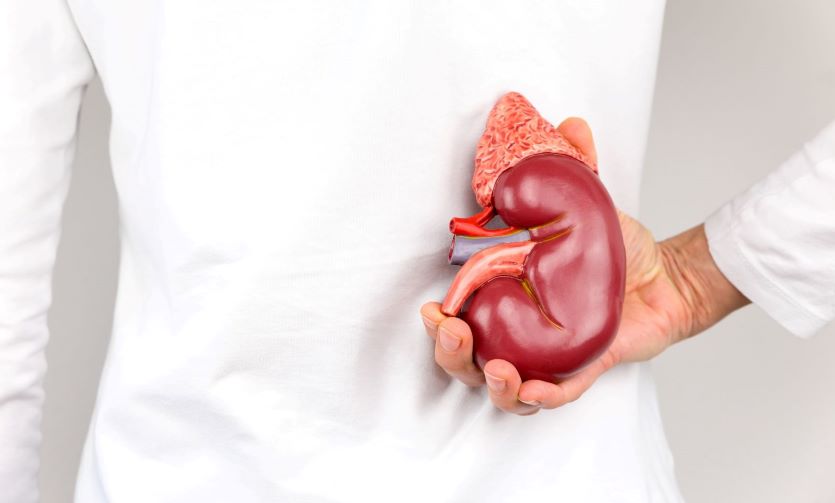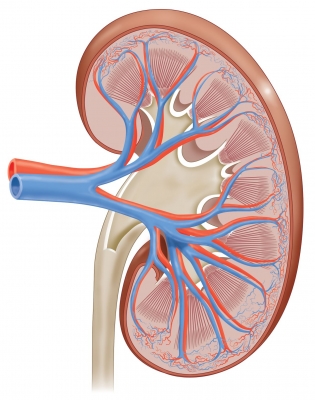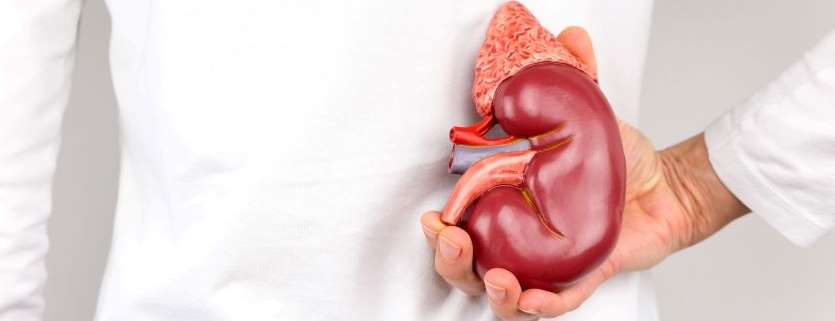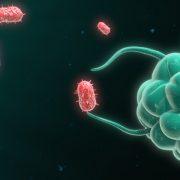How to Take Care of Your Kidneys

A healthy diet and plenty of water are benchmarks for proper nutrition. But how your body removes waste is equally as important as what goes into your system. Your kidneys are responsible for removing waste products from the body—along with other crucial actions. And while much focus is placed on other organ-specific health—like your heart and liver—learning how to take care of your kidneys can be a cornerstone of optimal health.
Your kidneys perform a variety of tasks:
- waste removal via urine
- balancing your body’s fluid levels
- releasing hormones to help maintain normal blood pressure
- activate vitamin D into a usable form used to help promote bone health
- control the production of red blood cells
Your kidneys regulate so many key functions to maintain your whole-body health. That’s why kidney health is crucial to keep your body operating at peak performance.
Learn more about how kidneys function, the ways vitamin D and kidney health connect, and how to take care of your kidneys—including the fuel they need for optimal health.
How Kidneys Function

Make a fist. That’s approximately the size of your kidney. You’re born with two kidneys located in the back of your abdomen, just under your ribcage on each side of the spine. They are slightly different sizes. Your right kidney is smaller and sits lower to make room for your liver.
To oversimplify how kidneys function, consider this: blood comes into the kidney and is filtered, good blood then returns to the circulatory system by way of the renal vein, and waste is expelled though the ureter into the bladder.
Taking a deeper look starts with a discussion of anatomy. Your kidneys contain millions of functioning units called nephrons. A nephron is the structural and functional unit of the kidney. They filter blood plasma to produce urine, while also reabsorbing water, sodium, and glucose back into the circulatory system.
Each nephron contains a renal corpuscle (the blood filtering component of the kidney) and a renal tubule (a secondary collection system for the filtered blood). Blood first passes into the renal corpuscle and enters a filtration space called the glomerulus. The glomerulus has a special barrier that keeps blood cells, proteins, and larger molecules in the blood, while allowing water, ions, and smaller molecules to exit the blood. This is the first step in creating urine.
At this point, the soon-to-be urine has most of the water and electrolytes that were in the blood. While the blood is lacking in these nutrients. The renal tubule moves most of the water, electrolytes, and other nutrients back into the blood. It leaves behind some water, urea, and other waste products.
This is one reason why staying hydrated is important. Without enough water, the kidneys can struggle to filter everything out and then pull the essential nutrients back into the bloodstream.
After filtering is complete, blood exits the kidney through the renal vein back to the heart. The waste and toxins pulled from the blood stream are sent through the ureter to the bladder for urination.
More Than a Filter
Balance in life is crucial, and your kidneys contribute to the balance in your circulatory system. Kidneys help regulate extracellular fluid volume, important to keep blood flowing to vital organs.
Examples of extracellular fluids are interstitial fluid, blood plasma, and lymph. The kidney also controls osmolarity and ion concentrations, making sure the extracellular fluids don’t become too diluted or concentrated. Osmolarity is key for proper fluid transportation because it’s a mechanism that allows extracellular fluids to pass across one membrane into another.
This ensures consistent levels of key ions (charged atoms or molecules)—including sodium, potassium, and calcium. Your kidneys also help with the regulation of blood plasma pH levels, which prevents your blood from becoming too acidic or basic.
Finally, kidneys produce the hormone erythropoietin (EPO). EPO plays a role in the production of red blood cells. Acting like a shield, EPO protects red blood cells during infancy, and, in turn, stimulates the stem cells in bone marrow to increase the production of additional red blood cells. Because red blood cells carry oxygen from the lungs to the rest of the body, it is important to maintain a proper level of EPO to maintain healthy production of new red blood cells.
Vitamin D and Kidney Health
Vitamin D is often called the “sunshine vitamin” because it can be produced in your skin from a response to sunlight. The kidneys play a key role in converting vitamin D into a useful nutrient for the body. People acquire vitamin D from two places: exposure to the sun’s ultraviolet B radiation and from their diet—food and supplements.
The kidneys pull vitamin D out of the blood, which is then sent to the skeletal system. But vitamin D is important for many reasons. An example is how it helps to regulate the amount of calcium and phosphate in your body to maintain healthy, normal levels. Specifically, vitamin D helps support healthy calcium absorption from the intestines. And when your body has optimal levels of calcium, it can maintain healthy bones, teeth, and muscles.
Through vitamin D, you can see why learning how to take care of your kidneys benefits other key organs and systems in your body, as well.
Tips on How to Take Care of Your Kidneys
You’ve learned how kidneys function. Now let’s explore how you can support optimal kidney health. Caring for your kidneys can have overlapping benefits for the rest of your body. And simple lifestyle changes go a long way to promote good kidney health and improve your general well-being.
- Stay Hydrated
Water is vital for good health, and it certainly assists your kidneys. Drinking eight glasses of water a day helps your kidneys have the fluid necessary to remove excessive sodium and toxins from your system.
The eight glasses number isn’t a recommendation. In fact, the exact volume of water you need to consume depends on your health and lifestyle. A good indicator you’re drinking enough water is straw-colored urine. If urine is too dark, it may be a sign of dehydration. Too clear, and you’re drinking too much water.
- Monitor Blood Pressure
The kidneys play an important role in blood pressure regulation. Healthy blood pressure readings are between 90/60mmHg and 120/80mmHg. Anything higher is considered to be elevated blood pressure. Your circulatory system and kidneys work in concert to keep your blood flowing at an even, healthy level. Speak to your physician or health-care provider if you have concerns about your blood pressure.
- Maintain Normal, Healthy Blood Sugar Levels
Keeping your blood sugar in the normal, healthy range helps maintain your kidney and overall health. Your kidneys are already hard at work filtering nutrients from your blood back into your body and removing waste. So keep your kidneys running smoothly by maintaining healthy blood sugar levels in the normal range.
- Exercise and Remain Active
While you can’t flex your kidneys, you can support them by walking, swimming, or cycling 150 minutes a week. Anything—from hikes in the forest to dancing—can help you stay closer to your ideal weight and avoid putting additional strain on your kidneys. Being overweight can raise your blood pressure, which is bad for your kidneys. But regular exercise is good for your waistline and your overall health.
- Eat a Healthy Diet
Diet and exercise go hand-in-hand for good health. But if you really want to show your kidneys some love, you’ll eat a low-sodium diet. Excessive sodium in your system is difficult for your kidneys to filter out. Consider eating a diet rich in fresh vegetables, fruit, fish, and whole grains. Avoid kidney-damaging foods like processed meats, excessive dairy, and packaged meals.
- Don’t Smoke
There are a thousand reasons to quit smoking. Here’s one more: Nicotine is bad for blood pressure, and therefore bad for kidney health.
Did You Know?
- You Only Need One Kidney to Live. You’re born with around 1.5 million nephrons—about 750,000 per kidney. You only need 300,000 to filter your blood daily.
- Hearts Pump, Kidneys Filter. Your kidneys filter half-a-cup of blood every minute. This is about 45 gallons of blood per day.
- Same but Different. Kidneys are asymmetrical. The right kidney is smaller and sits lower than the larger left kidney to leave space for your liver.
- DIY Kidney. Dutch doctor Willem Kolff made the first dialysis machine with a sausage casing, orange juice can, and a washing machine. The washing machine spun to filter the pumped-in blood.
- Water in Moderation. Too much liquid can cause hyponatremia, a condition where too much water in the system dilutes sodium the kidneys can’t remove.
- Swap It Out. The first successful kidney transplant was performed by Joseph E. Smith in Boston, Massachusetts in 1954.
Start Maintaining Your Kidney Health Today
A lifestyle focused on kidney health is good for total body health. A balanced diet combined with exercise is critical to maintain kidney health. And while you’re tending to the needs of your kidney, you’re also helping the other systems in your body. What’s good for the kidneys also helps the digestive system, heart, and immune system.
The human body is complex and integrated—with the kidneys playing a major role in supporting your overall wellness. Your kidneys are equally intricate and complex organs that help keep your body in balance. Making small steps to maintain a healthy blood pressure in the normal range can help your kidneys to function properly, too.
References
https://www.niddk.nih.gov/health-information/kidney-disease/kidneys-how-they-work.
https://ods.od.nih.gov/factsheets/VitaminD-HealthProfessional/
https://www.nhs.uk/live-well/healthy-body/keeping-your-kidneys-healthy/
https://www.karger.com/Article/Abstract/13440
https://www.proteinatlas.org/humanproteome/tissue/kidney
https://www.mdpi.com/2075-4418/6/1/2
https://pubmed.ncbi.nlm.nih.gov/24348156/
https://www.cancer.net/cancer-types/kidney-cancer/statistics
https://www.livescience.com/52047-kidneys.html
https://www.kidney-international.org/article/S0085-2538(15)50850-8/fulltext













